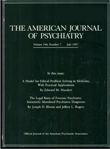Efficacy of antipsychotic medications in behaviorally disturbed dementia patients
Abstract
This study compared the therapeutic efficacy of thioridazine, loxapine, and a placebo in the treatment of behavioral disturbances in nursing home patients with dementia. Antipsychotic medications were effective for the specific behavioral problems of anxiety, excitement, emotional lability, and uncooperativeness. Subjects with the most severe symptoms at baseline assessment derived the greatest benefit from treatment. Sedation, extrapyramidal symptoms, and decreased blood pressure were common side effects among patients treated with the antipsychotic drugs. The authors conclude that antipsychotic medication has a definite but limited therapeutic role in the treatment of behavioral disturbances in nursing home patients with dementia.
Access content
To read the fulltext, please use one of the options below to sign in or purchase access.- Personal login
- Institutional Login
- Sign in via OpenAthens
- Register for access
-
Please login/register if you wish to pair your device and check access availability.
Not a subscriber?
PsychiatryOnline subscription options offer access to the DSM-5 library, books, journals, CME, and patient resources. This all-in-one virtual library provides psychiatrists and mental health professionals with key resources for diagnosis, treatment, research, and professional development.
Need more help? PsychiatryOnline Customer Service may be reached by emailing [email protected] or by calling 800-368-5777 (in the U.S.) or 703-907-7322 (outside the U.S.).



